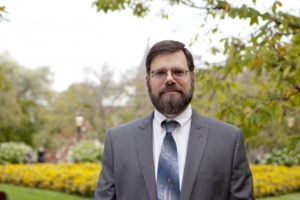
Menlo Park, Calif. ― Jonathan Pershing, former Special Envoy for Climate Change at the U.S. Department of State and lead U.S. negotiator to the UN Framework Convention on Climate Change, will join the William and Flora Hewlett Foundation as director of its Environment Program on January 17, 2017.
In his role as Special Envoy, Pershing directed international climate policy on behalf of the U.S. government and served as the U.S. representative at ministerial level climate sessions, including those of the United Nations. He was one of architects of the Major Economies Forum and the Clean Energy Ministerial, and has actively supported climate and sustainable development activity under the G7, G20 and other bodies. He also played a lead role in successfully negotiating landmark climate change deals with major nations including China, India, the European Union, Canada and Mexico. Pershing also played an instrumental role in securing the 2015 Paris climate agreement, and subsequently, as senior international climate advisor to the White House and Secretary of State, was charged with overseeing its early implementation.
In addition to his government service, Pershing has served in leadership of the nonpartisan, independent think tank World Resources Institute, where he supported domestic a and international climate and energy policy work, including advising both U.S. states and other governments as well as major U.S. and multinational companies on the business strategies for climate change and clean energy.
“The past few years have brought tremendous gains in the global effort to mitigate climate change, and Jonathan has been a critical part of that,” said Hewlett Foundation president Larry Kramer. “That’s hardly surprising, as few people working on this all-important problem have his unique combination of experience, expertise, and vision. We are both delighted and fortunate that, in joining the Hewlett Foundation, Jonathan can continue his efforts, now by enhancing the role of civil society and philanthropy in protecting our planet and its inhabitants from the potentially devastating effects of global warming.”
The William and Flora Hewlett Foundation is a 50-year-old nonpartisan, private charitable foundation, awarding roughly $400 million in grants in 2015 to organizations across the globe to help people build better lives. Environmental grantmaking has been a part of the foundation’s mission since its establishment in 1966, with a founding focus on preserving the North American West for the health of people and wildlife.
In 2008, after recognizing the weight of scientific evidence regarding the grave threat of climate change, especially on vulnerable populations worldwide, the Hewlett Foundation made a commitment that far exceeded any other pledge in the organization’s history: a five-year, $500 million commitment to support efforts to safeguard people from the negative effects of climate changeby reducing greenhouse gas emissions and ensuring clean and efficient energy. In 2013, the foundation renewed that commitment and pledged another $500 million through 2018.
“The global climate community has moved from an era of negotiation to one of implementation, and I cannot imagine a better and more significant platform from which to pursue this critical new agenda than the Hewlett Foundation,” said Pershing. “Now that national governments around the world have committed to act, civil society, business, and state and local governments must take up the baton. I am excited at the prospect of working with and supporting colleagues in the U.S. and internationally to create a fairer and more equitable, climate-friendly world, building on the enormous progress made, and taking advantage of the emerging new opportunities to build a more sustainable future.”
Pershing succeeds former program director Tom Steinbach, who became executive director of the San Francisco-based Sea Change Foundation at the end of his nine-year term at the Hewlett Foundation.
Previously Pershing also served as the Senior Climate Advisor to the U.S. Secretary of Energy and the Principal Deputy Director of the Office of Energy Policy and Systems Analysis at the Department of Energy. In these roles, Pershing focused on development of clean energy systems and served as a member of Department of Energy Secretary Ernest Moniz’s senior staff, providing strategic direction for U.S. energy policy. Among other responsibilities, he was a key architect of the “Mission Innovation” commitment to double climate and clean energy research and development budgets around the world, and a major contributor to the first ever “Quadrennial Energy Review,” a deep assessment of U.S. energy policy.
Before his appointments in the Obama Administration (including two stints at the State Department ― as Deputy Special Envoy with Todd Stern, and as Special Envoy ― as well as at the Energy Department), Pershing spent six years as the director of the Climate, Energy and Pollution Program at the World Resources Institute, a Washington, D.C., think tank; five years as the Head of the Environment Division at the International Energy Agency in Paris; and for nearly a decade in the 1990s, he served the Science Advisor and Deputy Director of the Office of Global Change in the U.S. Department of State.
Pershing holds a Ph.D. in geology and geophysics from the University of Minnesota. A scientist by training, he served as a lead author, review editor and contributor for reports of the Nobel-prize winning Intergovernmental Panel on Climate Change. He has also served as an adjunct faculty member at the University of Minnesota and at American University, and he has published and lectured widely on climate and energy issues. In addition, Pershing lived and worked for several years in Alaska in the energy and mining industry.
